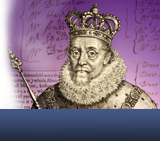A Baskett full of errors
No authoritative copy of the King James Bible survives. The manuscript, supposedly still in existence in 1655, is said to have perished in the Great Fire of London. The first editions were produced by the King’s Printer, Robert Barker, who despite his eminent position seems to have been a disorganised workman who introduced a large number of typographical errors. The first Cambridge edition of 1629 carefully revised the text, but Barker excelled himself in 1631 with the notorious ‘Wicked Bible’ which omitted the word ‘not’ from the Seventh Commandment. The translation itself was not universally admired either, the Puritan scholar Hugh Broughton damning it as soon as it appeared, and a later writer producing an 800 page volume on errors in the Pentateuch alone. Nonetheless, assisted by the monopoly of the King’s Printer, the new translation rapidly supplanted the Bishops’ Bible and, more slowly, the Geneva version. Plans for another rendering in the Commonwealth period came to nothing, and the King James version, dubbed the Authorised Version although no record survives of it ever having been authorised, reigned unchallenged until the 1880s.


